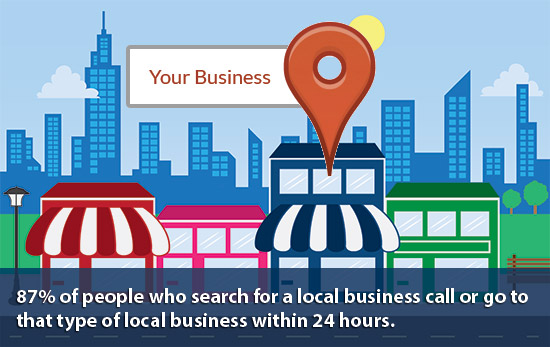Marketing Your Local Business Online
If you run a local business, you may be missing out on a wealth of effective and economical online marketing opportunities. Search Engine Optimization (SEO) is known for connecting people around the globe with their target products and successfully promoting businesses. It’s even more well known for marketing local businesses in their communities. There is an entire world of marketing opportunities available for location-based businesses, including search, social, and content marketing options. In this guide, we look into two marketing strategies that successful local businesses use to boost their local SEO. Follow these SEO steps to getting noticed in your local community searches.

Optimizing your website for local search is one of the top priorities.
There are a number of ways you can optimize your website for local search that will help attract local clients and customers. The first thing you need to do is identify your keywords. These are the words (usually a short phrase) that describe your business. If, for example, you run a wedding photography business, your keywords might be “wedding photographer.” To localize your business, add the city you target to that phrase, e.g. “Naperville wedding photographer” or “Glen Ellyn Wedding Photography.” Read the Small Business SEO Guide, do some keyword research to make sure the city + keyword phrase has strong search volume, then optimize your website for the best locally focused keywords using the on-site optimization tips in the guide.
Next, include a local street address and phone number (with a local area code, not 800 number) on each page of your website. Most businesses do this in the footer. This information must be on the website in text, not image format, so that search engines can crawl the information. If your business has multiple locations, the alternative is to put the primary location on each page and create individual contact pages for each location.
Tip: Make sure your website has a contact page for each location that includes the address, phone number, and a map helping customers find it. Adding photos of each location on the contact page is also a good idea.
Find the right local directories to join
Local directories and review sites are often referred to as “citations,” and they can help your business website rank well in local search results on Google. Here are the keys to ensuring each local directory and review site you join counts towards helping your business rank well in local search:
- Make sure your business name, address, phone number, and website are consistent, on both your website and in local listings. Things that will cause ranking problems include having your business name listed as ABC Services in one place and A.B.C. Services in another, or having your address listed as 1500 West First St. in one place and 1500 W. First Street in another, or having your website address listed as abcservices.com in one place and www.abcservices.com/index.html in another.
- Encourage (but do not incentivize, bribe, or purchase) customers to write reviews about your business on the top local directories and review sites. The more positive reviews you have, the better your business is going to rank.
- Complete each of your local listing profiles as thoroughly as possible. If you are given the option of adding additional information, social network links, photos, and videos, be sure to do so.
With hundreds of local directories, review sites, and profile pages, choosing which ones to sign up for can be difficult. Start here:
- Create listings on Google+ Local, Yahoo Local, Bing Local, and Yelp.
- Search for your business name using Google and then claim and complete profiles for any of the listings that appear on the first couple of search engine results pages (SERPs).
- Use the GetListedresource pages to find the best citations for your business based on industry and city.
To get in a wide array of listings without spending a lot of time, you can use services like Universal Business Listing. You complete a profile in their system, and they take that information and populate it across all of the local directories and review sites. You can also use tools like Whitespark to find citations for your competitors. They also offer a free review handout generator that helps you create a guide for your customers to use on how to do reviews for your business.
Don’t forget about local media and organizations such as newspapers, news stations, and chambers of commerce. Many have their own business directory that you can get listed in simply by asking or becoming a member.
You can also reach out to local business owners to see if they are willing to become referral partners. For example, caterers, wedding planners and florists would be ideal referral partners for a wedding photographer. Look for local businesses with partner’s pages or local resource pages.
